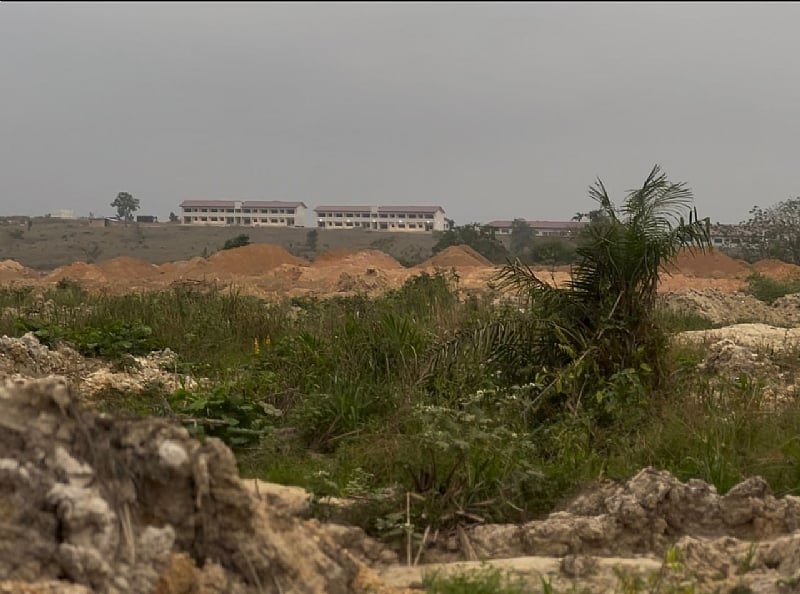The once-tranquil farming community of Adaase in Obuasi, Ghana, is now gripped by fear and anxiety as illegal mining activities escalate at an alarming rate. The destructive practice, often referred to as “galamsey,” is not only obliterating arable land and polluting water sources but also poses a direct threat to critical infrastructure, including the Obuasi Airport, a nascent military barracks under construction, and other vital installations. This surge in illegal mining, despite widespread condemnation and ongoing efforts to combat it, has left residents feeling vulnerable and questioning the effectiveness of existing measures to curb the menace. The situation underscores a complex interplay of local politics, economic desperation, and environmental degradation, highlighting the challenges faced by communities grappling with the devastating consequences of illegal resource extraction.
The destructive footprint of illegal mining in Adaase is extensive and far-reaching. Thousands of plots of land, once designated for community development projects like a hostel facility, have been overrun by illegal miners, effectively halting progress and stifling local aspirations. The ecological damage is equally alarming. Lush farmlands, the lifeblood of the community, have been transformed into barren wastelands, punctuated by hazardous mining pits. A particularly poignant example is the case of a local farmer whose entire oil palm plantation, intended to supply a nearby factory, was decimated by illegal mining activities. This loss not only represents a personal tragedy for the farmer but also signifies a broader economic setback for the community and the region. The relentless encroachment of illegal mining operations towards the Obuasi Airport raises serious concerns about the safety and viability of this essential transportation hub. The proximity of the mining activities to the airport runway poses a potential hazard to aircraft and underscores the severity of the situation.
Nana Kwabena Oyiakwan II, Chief of Kwapia, has emerged as a vocal critic of the rampant illegal mining in Adaase. Leading a combined force of police officers and National Investigations Bureau personnel, the chief recently spearheaded an operation that resulted in the arrest of five illegal miners in the area. Speaking to the media following the arrests, Nana Oyiakwan II didn’t mince words, directly accusing the former Obuasi Municipal Chief Executive, Elijah Adansi-Bonah, of being complicit in the illegal mining activities. He alleges that Adansi-Bonah not only participated in but also oversaw the destruction of vast tracts of land, vowing to pursue legal action against him. The chief’s accusations highlight the potential involvement of local authorities in the illegal mining trade, adding another layer of complexity to the issue. He further contended that Adansi-Bonah’s involvement in illegal mining contributed to the poor performance of the New Patriotic Party in the 2024 general elections, suggesting that the community’s discontent with the issue had political ramifications.
The chief’s concerns are echoed by residents of Adaase, who are witnessing the destruction of their environment and the erosion of their livelihoods. Collins, a youth leader in the community, fears that the unchecked illegal mining will deter people from settling in Adaase, hindering its development potential. He points to the presence of the airport and the military camp as assets that should make Adaase an attractive location for residential development, but the pervasive illegal mining casts a long shadow over these prospects. Papa Yaw, another resident, expresses his frustration at the destruction of water bodies and farmlands, emphasizing that the community has not derived any benefit from the illegal mining operations, which have instead brought widespread condemnation and hardship. Their testimonies paint a grim picture of a community struggling to cope with the environmental and economic consequences of illegal mining.
The failure of the AngloGold Ashanti Obuasi Goes Agro project, an initiative aimed at promoting agricultural development in the area, is cited as further evidence of the destructive impact of illegal mining. Nana Oyiakwan II alleges that the project was thwarted by illegal miners who encroached upon and destroyed the designated farmland, effectively undermining a valuable opportunity for economic diversification and community empowerment. He also questions the silence of AngloGold Ashanti regarding the proximity of illegal mining to their airport, implying a lack of engagement from the company in addressing a critical threat to their own infrastructure. This situation highlights the vulnerability of development initiatives to external pressures and the need for stronger partnerships between companies, local communities, and authorities to protect shared interests.
The unfolding crisis in Adaase mirrors the broader challenge faced by many communities across Ghana grappling with the scourge of illegal mining. The environmental devastation, economic losses, and social disruption caused by galamsey demand a multifaceted response. Strengthening law enforcement, promoting sustainable livelihoods, and fostering greater community engagement are crucial steps in addressing this complex issue. Holding those responsible accountable, regardless of their position or influence, is essential to deter future illegal activities and restore trust in local governance. The situation in Adaase serves as a stark reminder of the urgent need for concerted action to protect vulnerable communities and preserve the environment for future generations. The future of Adaase, and communities like it, hinges on the collective will to combat illegal mining and build a more sustainable and equitable future.














